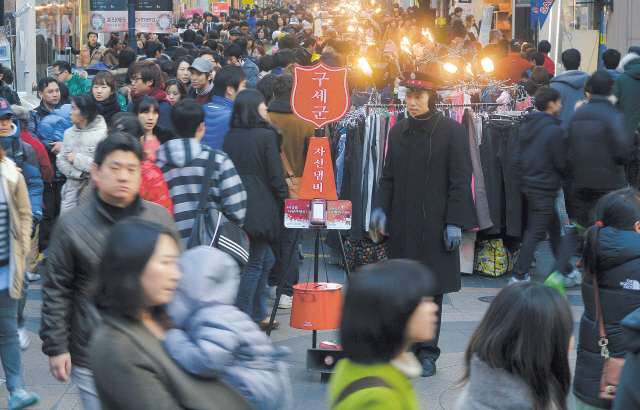Kettle heralds season of giving and sharing
Salvation Army hopes to raise 5 billion won this year
By Park Hyung-kiPublished : Dec. 7, 2012 - 19:57
On the shopping streets of Myeong-dong, it is hard to miss the sound of a bell rung by a man clad in a military-style black coat and hat.
Standing beside a tripod with a bright red kettle hanging from it, and facing a line of trees and buildings glistening with Christmas lights, the man continues to ring the bell to attract attention.
Standing beside a tripod with a bright red kettle hanging from it, and facing a line of trees and buildings glistening with Christmas lights, the man continues to ring the bell to attract attention.

The sound, the handbell, the kettle and the man are all too familiar to hundreds of Korean passersby at this time of the year, when the cold begins to bite.
They have been part of the season in Korea for more than 100 years.
“Hello, this is the Salvation Army. Let us ring this bell of love together and help our neighbors in need,” calls out David Park, a cadet of the Army, standing at the entrance to the shopping district.
Five other red kettles have been positioned nearby in Myeong-dong, each with a team of two cadets who share a common mission and vision with some 50,000 Army officials, cadets and volunteers ringing their bells beside more than 300 kettles in 76 locations in Korea.
Their mission is to “share and love in the name of God,” Park told The Korea Herald.
“We carry out this mission at the end of every year with a specific motto in our minds: hold bread in one hand, the Bible in the other. Put your heart toward God while extending your hands to neighbors,” he said.
“I am thankful to people sharing their love for the poor especially in this time of economic slowdown.”
This is when people show more support via donations than any other time, contrary to the belief that they tighten their wallets to save money in the slowdown period, he said.
The bread represents a special meaning as it was used as a main commodity to help the poor during the Industrial Revolution in Britain, where the Salvation Army began in 1865, he explained.
The Army currently carries out operations for children, the elderly, the poor and patients in 126 countries. It came to Korea in 1908 and started the red kettle donation program on the streets in 1928 when the Army raised 848 won ― enough back then to buy 56 80-kilogram bags of rice.
The Army is aiming to raise 5 billion won ($4.6 million) between Nov. 30 and Dec. 24 this year when its officers, cadets and volunteers hit the streets and ring the bells provided by Samsung Fire with kettles by Fissler. It received 4.9 billion won in donations from some 5 million people last year, and says it fully discloses them every year for transparency.

This year, the Christian organization features an electronic device attached to the tripod so people can donate by swiping their credit cards. The Credit Finance Association provided the mobile device.
“We’re also thankful that the number of corporate participants grows every year,” Park said.
Shinhan Card employees provide assistance in the kettle donation program on the streets ringing the bells together with the Army staff, while Kookmin Bank helps the Army build and remodel housing for the poor, he mentioned.
But standing in the subzero-degree weather is not all that easy.
Feet get icy cold instantly, and arms get tired from shaking the bell in a constant motion of ups and downs.
“It’s not as easy as it looks,” said Kim Seon-wha, Park’s partner who just came to take his place for an hour.
“Wearing long johns is a must for this job,” Park said. “I first joked about how men can wear those. But you really need them to keep yourself warm.”
However, for new cadets such as Hannah Chung, who is at her first year at the Army training college, the experience is refreshing.
“I don’t feel tired at all. It feels great to see people and ring the bell, which is kind of like a reminder that it’s almost time for Christmas,” said Chung, who is working some 50 meters away on the same street as Park.
As cadets continue to toll their bells, people stop for a few seconds to drop their coins or bills from 1,000 won to as much as 10,000 and 50,000 won into the red pot, while others swipe their credit cards on the mobile device to make a fixed donation of 2,000 won.
The sound of the Salvation Army bell, as famous as it is, not only brings the holiday spirit, but also makes a lot of passersby feel a bit sad as well.
“It’s kind of bittersweet to hear that bell sound every year on this street. More bitter than sweet because it reminds me that I am just getting older and older,” quipped 63-year-old Lee Syung-kyu, who donated via credit card.
“I’m glad though to see the Salvation Army adopting a credit card donation system because nowadays very few carry cash around.”
Miki Tanabata, a tourist from Japan said, “I just say in my mind, ‘It’s the end of the year,’” while letting out a sigh and then a laugh. She added that she heard about the Korean Salvation Army’s kettle donation, which she said was not very common to see in Japan, while studying the Korean language.
For Xing Wei from China, who was not too familiar with the scenery of ringing bells and red kettles, they offered a unique experience of Korea.
“It’s for goodwill?” Wei asked. He took out a 1,000 won bill and donated it after hearing the explanation about the kettle and the bell, which are used to raise awareness of supporting the poor.
The Korean Salvation Army’s commander Park Man-hee said the donations would also be used to help people in poor countries including North Korea.
By Park Hyong-ki & Kim Young-won
(hkp@heraldcorp.com)(wone0102@heraldcorp.com">hkp@heraldcorp.com)(wone0102@heraldcorp.com)
They have been part of the season in Korea for more than 100 years.
“Hello, this is the Salvation Army. Let us ring this bell of love together and help our neighbors in need,” calls out David Park, a cadet of the Army, standing at the entrance to the shopping district.
Five other red kettles have been positioned nearby in Myeong-dong, each with a team of two cadets who share a common mission and vision with some 50,000 Army officials, cadets and volunteers ringing their bells beside more than 300 kettles in 76 locations in Korea.
Their mission is to “share and love in the name of God,” Park told The Korea Herald.
“We carry out this mission at the end of every year with a specific motto in our minds: hold bread in one hand, the Bible in the other. Put your heart toward God while extending your hands to neighbors,” he said.
“I am thankful to people sharing their love for the poor especially in this time of economic slowdown.”
This is when people show more support via donations than any other time, contrary to the belief that they tighten their wallets to save money in the slowdown period, he said.
The bread represents a special meaning as it was used as a main commodity to help the poor during the Industrial Revolution in Britain, where the Salvation Army began in 1865, he explained.
The Army currently carries out operations for children, the elderly, the poor and patients in 126 countries. It came to Korea in 1908 and started the red kettle donation program on the streets in 1928 when the Army raised 848 won ― enough back then to buy 56 80-kilogram bags of rice.
The Army is aiming to raise 5 billion won ($4.6 million) between Nov. 30 and Dec. 24 this year when its officers, cadets and volunteers hit the streets and ring the bells provided by Samsung Fire with kettles by Fissler. It received 4.9 billion won in donations from some 5 million people last year, and says it fully discloses them every year for transparency.

This year, the Christian organization features an electronic device attached to the tripod so people can donate by swiping their credit cards. The Credit Finance Association provided the mobile device.
“We’re also thankful that the number of corporate participants grows every year,” Park said.
Shinhan Card employees provide assistance in the kettle donation program on the streets ringing the bells together with the Army staff, while Kookmin Bank helps the Army build and remodel housing for the poor, he mentioned.
But standing in the subzero-degree weather is not all that easy.
Feet get icy cold instantly, and arms get tired from shaking the bell in a constant motion of ups and downs.
“It’s not as easy as it looks,” said Kim Seon-wha, Park’s partner who just came to take his place for an hour.
“Wearing long johns is a must for this job,” Park said. “I first joked about how men can wear those. But you really need them to keep yourself warm.”
However, for new cadets such as Hannah Chung, who is at her first year at the Army training college, the experience is refreshing.
“I don’t feel tired at all. It feels great to see people and ring the bell, which is kind of like a reminder that it’s almost time for Christmas,” said Chung, who is working some 50 meters away on the same street as Park.
As cadets continue to toll their bells, people stop for a few seconds to drop their coins or bills from 1,000 won to as much as 10,000 and 50,000 won into the red pot, while others swipe their credit cards on the mobile device to make a fixed donation of 2,000 won.
The sound of the Salvation Army bell, as famous as it is, not only brings the holiday spirit, but also makes a lot of passersby feel a bit sad as well.
“It’s kind of bittersweet to hear that bell sound every year on this street. More bitter than sweet because it reminds me that I am just getting older and older,” quipped 63-year-old Lee Syung-kyu, who donated via credit card.
“I’m glad though to see the Salvation Army adopting a credit card donation system because nowadays very few carry cash around.”
Miki Tanabata, a tourist from Japan said, “I just say in my mind, ‘It’s the end of the year,’” while letting out a sigh and then a laugh. She added that she heard about the Korean Salvation Army’s kettle donation, which she said was not very common to see in Japan, while studying the Korean language.
For Xing Wei from China, who was not too familiar with the scenery of ringing bells and red kettles, they offered a unique experience of Korea.
“It’s for goodwill?” Wei asked. He took out a 1,000 won bill and donated it after hearing the explanation about the kettle and the bell, which are used to raise awareness of supporting the poor.
The Korean Salvation Army’s commander Park Man-hee said the donations would also be used to help people in poor countries including North Korea.
By Park Hyong-ki & Kim Young-won
(hkp@heraldcorp.com)(wone0102@heraldcorp.com">hkp@heraldcorp.com)(wone0102@heraldcorp.com)





![[Weekender] How DDP emerged as an icon of Seoul](http://res.heraldm.com/phpwas/restmb_idxmake.php?idx=644&simg=/content/image/2024/04/25/20240425050915_0.jpg&u=)


![[Music in drama] An ode to childhood trauma](http://res.heraldm.com/phpwas/restmb_idxmake.php?idx=644&simg=/content/image/2024/04/25/20240425050929_0.jpg&u=)








![[Herald Interview] Mistakes turn into blessings in street performance, director says](http://res.heraldm.com/phpwas/restmb_idxmake.php?idx=652&simg=/content/image/2024/04/28/20240428050150_0.jpg&u=20240428174656)
